Communications and Control Engineering
�
Published titles include:
Stability and Stabilization of Infinite Dimensional Systems with Applications
Zheng-Hua Luo, Bao-Zhu Guo and Omer Morgul
Nonsmooth Mechanics (Second edition)
Bernard Brogliato
Nonlinear Control Systems II
Alberto Isidori
L2-Gain and Passivity Techniques in Nonlinear Control
Arjan van der Schaft
Control of Linear Systems with Regulation and Input Constraints
Ali Saberi, Anton A. Stoorvogel and Peddapullaiah Sannuti
Robust and H∞ Control
Ben M. Chen
Computer Controlled Systems
Efim N. Rosenwasser and Bernhard P. Lampe
Dissipative Systems Analysis and Control
Rogelio Lozano, Bernard Brogliato, Olav Egeland and Bernhard Maschke
Control of Complex and Uncertain Systems
Stanislav V. Emelyanov and Sergey K. Korovin
Robust Control Design Using H∞ Methods
Ian R. Petersen, Valery A. Ugrinovski and Andrey V. Savkin
Model Reduction for Control System Design
Goro Obinata and Brian D.O. Anderson
Control Theory for Linear Systems
Harry L. Trentelman, Anton Stoorvogel and Malo Hautus
Functional Adaptive Control
Simon G. Fabri and Visakan Kadirkamanathan
Positive 1D and 2D Systems
Tadeusz Kaczorek
Identification and Control Using Volterra Models
F.J. Doyle III, R.K. Pearson and B.A. Ogunnaike
Non-linear Control for Underactuated Mechanical Systems
Isabelle Fantoni and Rogelio Lozano
Robust Control (Second edition)
Ju¨rgen Ackermann
Flow Control by Feedback
Ole Morten Aamo and Miroslav Krstic´
Learning and Generalization (Second edition)
Mathukumalli Vidyasagar
Constrained Control and Estimation
Graham C. Goodwin, Marı´a M. Seron and Jose´ A. De Dona´
Randomized Algorithms for Analysis and Control of Uncertain Systems
Roberto Tempo, Giuseppe Calafiore and Fabrizio Dabbene
�
Zhendong Sun and Shuzhi S. Ge
Switched Linear Systems
Control and Design
With 52 Figures
�
Zhendong Sun, PhD
Hamilton Institute, National University of Ireland, Maynooth, County Kildare, Ireland
Shuzhi Sam Ge, PhD, DIC
Department of Electrical and Computer Engineering, National University of Singapore,
Singapore 117576
Series Editors
E.D. Sontag • M. Thoma • A. Isidori • J.H. van Schuppen
British Library Cataloguing in Publication Data
Sun, Zhendong, 1968–
Switched linear systems : control and design. -
(Communication and control engineering)
1. Linear control systems
I. Title
629.8′32
II. Ge, S. S. (Shuzhi S.)
2. Switching theory
ISBN 1852338938
Library of Congress Cataloging-in-Publication Data
p. cm. — (Communications and control engineering, ISSN 0178-5354)
ISBN 1-85233-893-8 (alk. paper)
Apart from any fair dealing for the purposes of research or private study, or criticism or review, as
permitted under the Copyright, Designs and Patents Act 1988, this publication may only be repro-
duced, stored or transmitted, in any form or by any means, with the prior permission in writing of
the publishers, or in the case of reprographic reproduction in accordance with the terms of licences
issued by the Copyright Licensing Agency. Enquiries concerning reproduction outside those terms
should be sent to the publishers.
Communications and Control Engineering Series ISSN 0178-5354
ISBN 1-85233-893-8 Springer London Berlin Heidelberg
Springer is a part of Springer Science+Business Media
springeronline.com
© Springer-Verlag London Limited 2005
Printed in the United States of America
The use of registered names, trademarks, etc. in this publication does not imply, even in the absence
of a specific statement, that such names are exempt from the relevant laws and regulations and
therefore free for general use.
The publisher makes no representation, express or implied, with regard to the accuracy of the infor-
mation contained in this book and cannot accept any legal responsibility or liability for any errors
or omissions that may be made.
Typesetting: Camera-ready by authors
69/3830-543210 Printed on acid-free paper
SPIN 10990476
�
For our parents with love and gratitude.
For Hui and Jinlan, and our children with love and pride.
�
I keep the subject constantly before me and wait till the first
dawnings open little by little into the full light.
— Sir Isaac Newton
�
Preface
A switched linear system is a hybrid system which consists of several linear
subsystems and a rule that orchestrates the switching among them. Switched
linear systems provide a framework which bridges the linear systems and
the complex and/or uncertain systems. On one hand, switching among linear
systems may produce complex system behaviors such as chaos and multiple
limit cycles. On the other hand, switched linear systems are relatively easy
to handle as many powerful tools from linear and multilinear analysis are
available to cope with these systems. Moreover, the study of switched linear
systems provides additional insights into some long-standing and sophisticated
problems, such as intelligent control, adaptive control, and robust analysis and
control.
Switched linear systems have been investigated for a long time in the
control literature and have attracted increasingly more attention since the
1990s. The literature grew exponentially and quite a number of fundamental
concepts and powerful tools have been developed from various disciplines.
Despite the rapid progress made so far, many fundamental problems are still
either unexplored or less well understood. In particular, there still lacks a
unified framework that can cope with the core issues in a systematic way.
This motivated us to write the current monograph.
The book presents theoretical explorations on several fundamental prob-
lems for switched linear systems. By integrating fresh concepts and state-of-
the-art results to form a systematic approach for the switching design and
feedback control, a basic theoretical framework is formed towards a switched
system theory which not only extends the theory of linear systems, but also
applies to more realistic problems.
The book is primarily intended for researchers and engineers in the sys-
tem and control community. It can also serve as complementary reading for
linear/nonlinear system theory at the post-graduate level.
The book contains seven chapters which exploit several independent yet
related topics in detail.
�
viii
Preface
Chapter 1 introduces the system description, background and motivation
of the study, and presents several general concepts and fundamental observa-
tions which provide a sound base for the book.
Chapter 2 concisely reviews some necessary facts from Wonham’s geomet-
ric method, linear algebra and stability theory, as well as other useful tools
such as differential inclusion theory, Lie algebra, and automata theory.
Chapter 3 deals with stabilizing switching design for switched autonomous
systems. Besides stability, the switching frequency and robustness are also
considered. First, general results are presented for pointwise/consistent sta-
bilization. Second, based on the average method, periodic switching laws are
designed to steer the switched systems stable. Third, a state-feedback switch-
ing law is presented based on an appropriate partition of the state space. To
avoid possible chattering induced by the perturbations, a modified strategy
is proposed by introducing a positive level set. Fourth, to further reduce the
switching frequency, a combined switching law is developed by integrating the
time-driven switching mechanism with the state-feedback switching scheme.
An observer-based switching law is also formulated for the case when the state
information is not available. Finally, the discrete-time counterparts are briefly
discussed.
In Chapter 4, we address the controllability, observability, feedback equiv-
alence and canonical forms for switched control systems. For continuous-time
systems, we prove that both the controllable set and the unobservable set are
subspaces of the total space. Verifiable geometric characterizations are pre-
sented for the controllable/unobservable subspaces. Based on these, a switched
control system can be brought into the canonical decomposition via suitable
coordinate and feedback transformations. Parallel results are presented for
discrete-time switched systems. The chapter also investigates the problem of
sampling without loss of controllability. Sampling criteria are obtained and
various regular switching and digital control schemes are discussed in detail.
In addition, we discuss in depth several other issues including the controllabil-
ity under constrained switching/input, local controllability, and decidability
of controllability/observability.
The problem of feedback stabilization is investigated in Chapter 5. Stabi-
lizing design for switched control systems is challenging since both the control
input and the switching law are design variables, and their interaction must
be fully understood. Based on the canonical decomposition, we are able to
design stabilizing switching/input laws for several classes of switched control
systems. In particular, for a linear system controlled by multiple controllers
and measured by multiple sensors, an elegant and complete treatment is pre-
sented for the problem of dynamic output feedback stabilization. We also solve
the stabilization problem for the switched linear system where the summation
of the controllability subspaces of the individual subsystems is the total state
space. For the case that the system is completely controllable, several suffi-
cient conditions are presented for quadratic stabilizability and non-quadratic
stabilizability as well. For the most general setting where both controllable
�
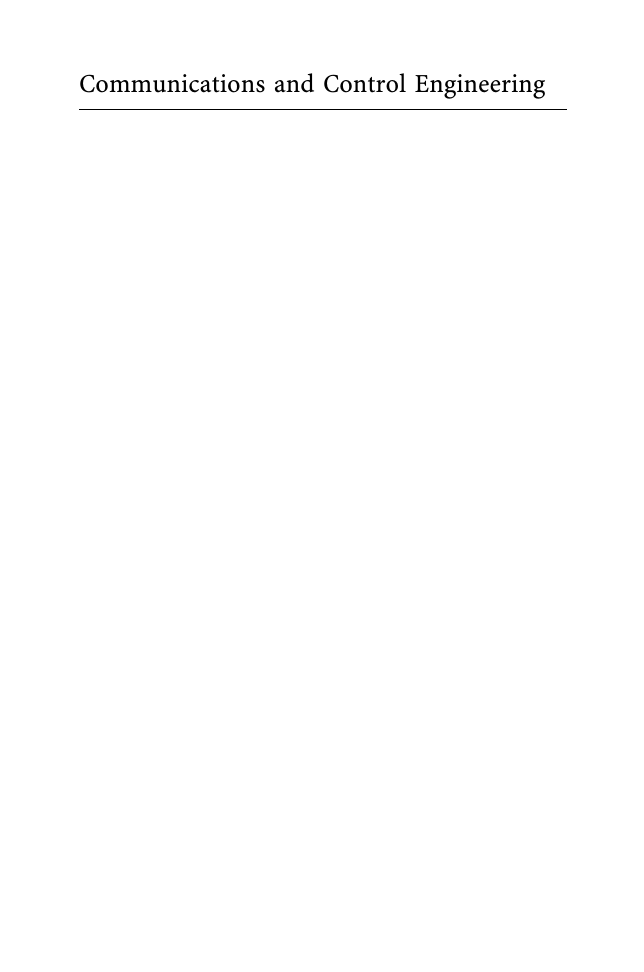
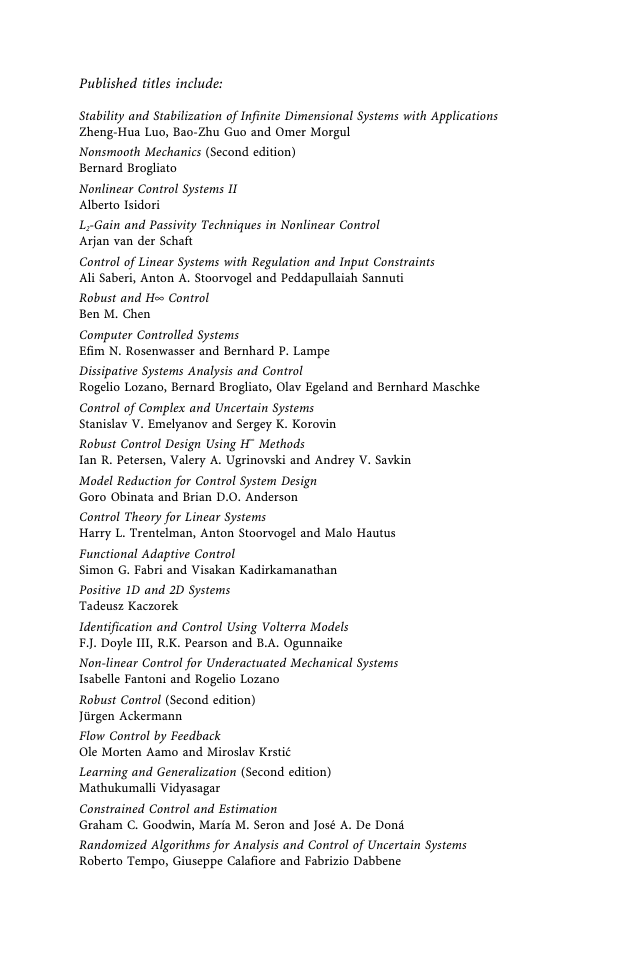
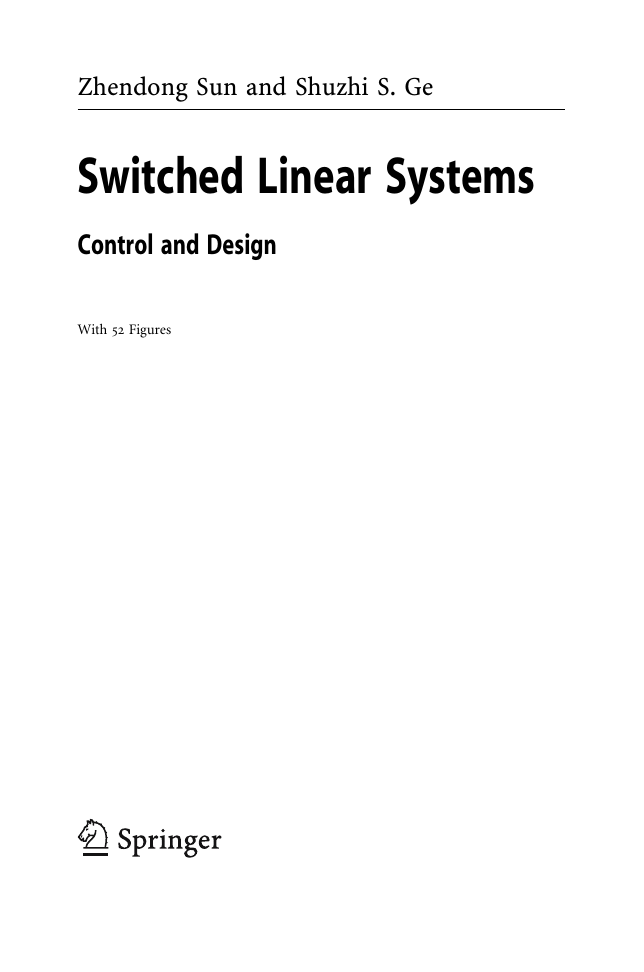
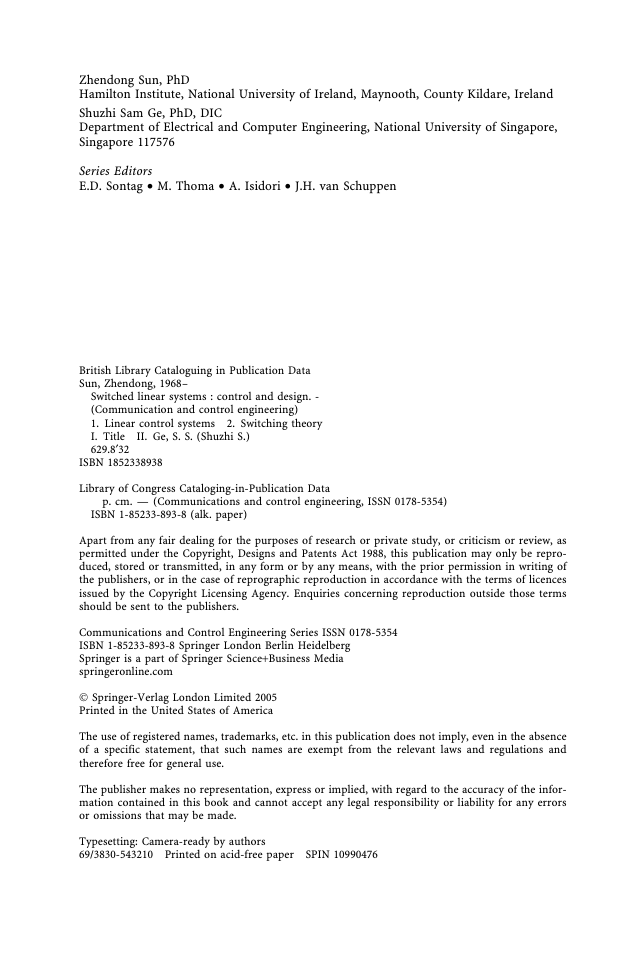
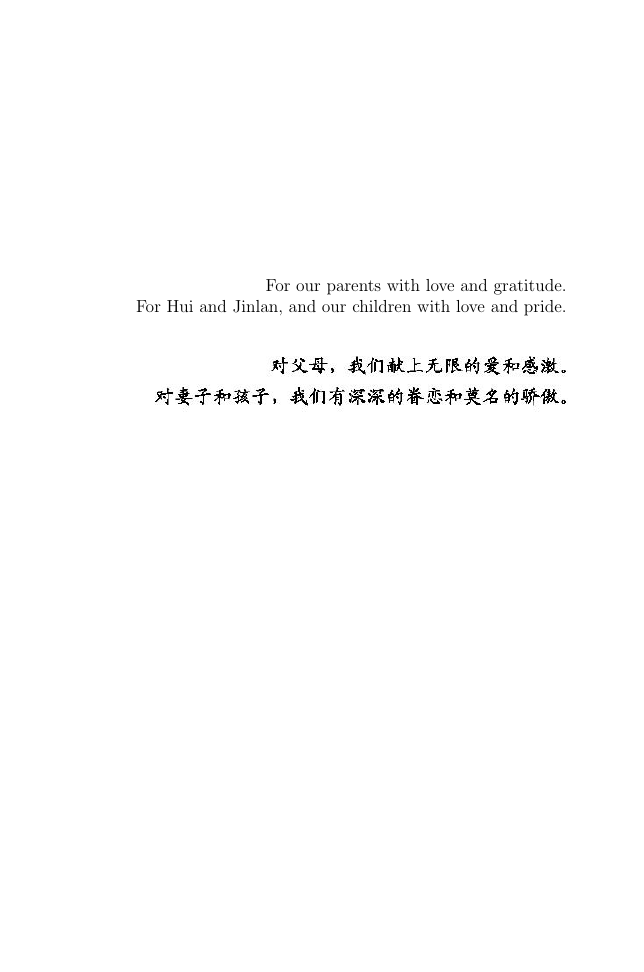

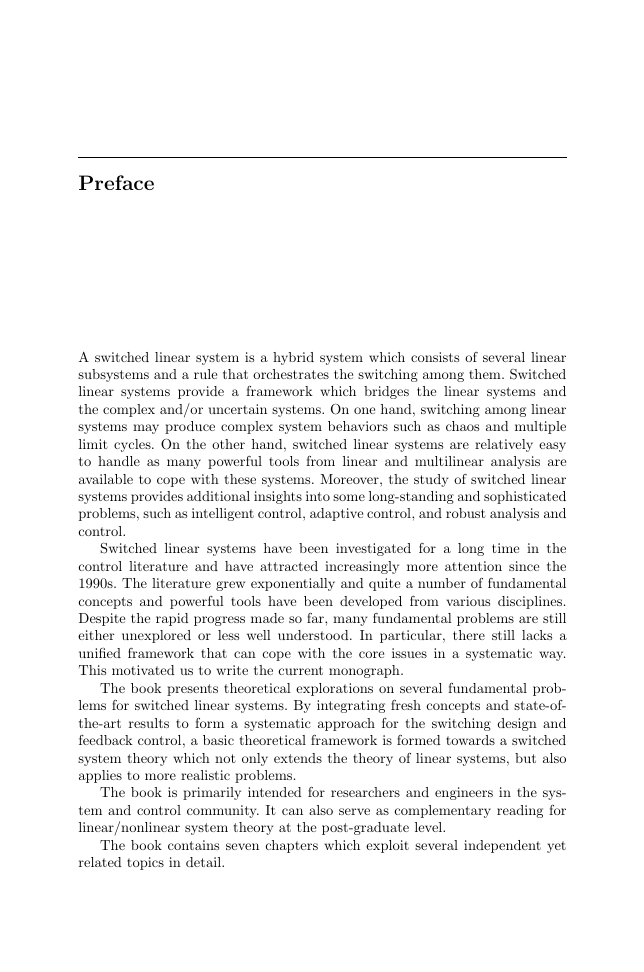
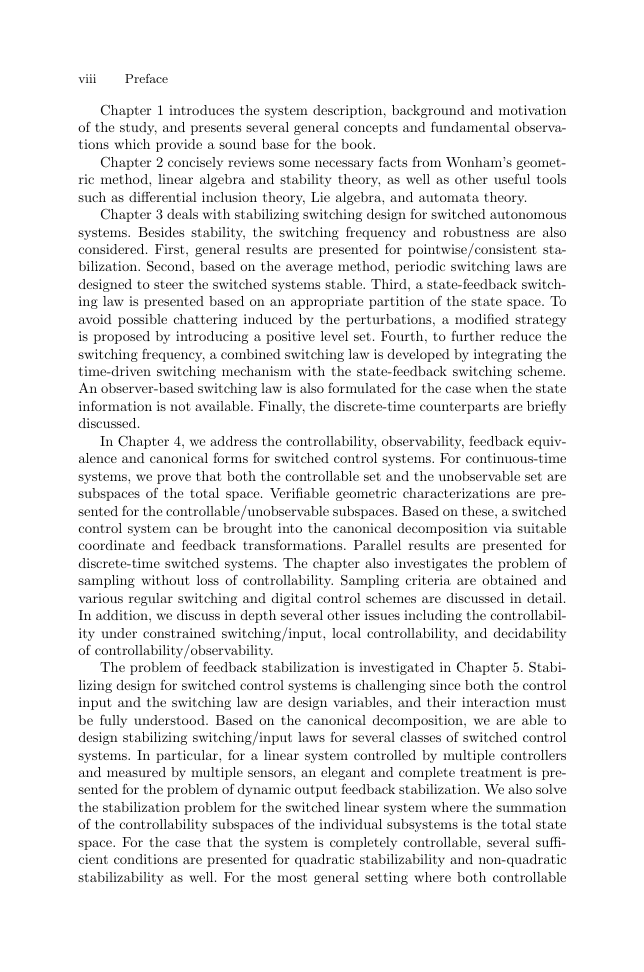








 2023年江西萍乡中考道德与法治真题及答案.doc
2023年江西萍乡中考道德与法治真题及答案.doc 2012年重庆南川中考生物真题及答案.doc
2012年重庆南川中考生物真题及答案.doc 2013年江西师范大学地理学综合及文艺理论基础考研真题.doc
2013年江西师范大学地理学综合及文艺理论基础考研真题.doc 2020年四川甘孜小升初语文真题及答案I卷.doc
2020年四川甘孜小升初语文真题及答案I卷.doc 2020年注册岩土工程师专业基础考试真题及答案.doc
2020年注册岩土工程师专业基础考试真题及答案.doc 2023-2024学年福建省厦门市九年级上学期数学月考试题及答案.doc
2023-2024学年福建省厦门市九年级上学期数学月考试题及答案.doc 2021-2022学年辽宁省沈阳市大东区九年级上学期语文期末试题及答案.doc
2021-2022学年辽宁省沈阳市大东区九年级上学期语文期末试题及答案.doc 2022-2023学年北京东城区初三第一学期物理期末试卷及答案.doc
2022-2023学年北京东城区初三第一学期物理期末试卷及答案.doc 2018上半年江西教师资格初中地理学科知识与教学能力真题及答案.doc
2018上半年江西教师资格初中地理学科知识与教学能力真题及答案.doc 2012年河北国家公务员申论考试真题及答案-省级.doc
2012年河北国家公务员申论考试真题及答案-省级.doc 2020-2021学年江苏省扬州市江都区邵樊片九年级上学期数学第一次质量检测试题及答案.doc
2020-2021学年江苏省扬州市江都区邵樊片九年级上学期数学第一次质量检测试题及答案.doc 2022下半年黑龙江教师资格证中学综合素质真题及答案.doc
2022下半年黑龙江教师资格证中学综合素质真题及答案.doc